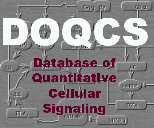 |  |  PKA PKA |
Enter a Search String | | Special character and space not allowed in the query term.
Search string should be at least 2 characters long. |
| | Kd is calculated only for second order reactions, like nA+nB <->nC or nA<->nC+nD, where n is number and A,B,C,D are molecules, where as for first order reactions Keq is calculated. Kd for higher order reactions is not considered. |
| | Name | Kf | Kb | Kd | tau | Substrate | Product | | 1 |
Ca_stoch | kf
(s^-1) | 100
(s^-1) | Keq = 1(uM) | 0.005sec | Ca_input
| Ca
| | 2 |
Ras-act-craf | kf
(uM^-1 s^-1) | 0.5
(s^-1) | Kd(bf) = 0.05(uM) | - | craf-1*
GTP-Ras
| Raf*-GTP-Ras
| | | Assume the binding is fast and limited only by the amount of Ras* available. So kf=kb/[craf-1] If kb is 1/sec, then kf = 1/0.2 uM = 1/(0.2 * 6e5) = 8.3e-6 Later: Raise it by 10 X to 4e-5 From Hallberg et al JBC 269:6 3913-3916 1994, 3% of cellular Raf is complexed with Ras. So we raise kb 4x to 4 This step needed to memb-anchor and activate Raf: Leevers et al Nature 369 411-414 May 16, 2003 Changed Ras and Raf to synaptic levels, an increase of about 2x for each. To maintain the percentage of complexed Raf, reduced the kf by 2.4 fold to 10. | | 3 |
Ras-act-unphosph
-raf | kf
(uM^-1 s^-1) | 1
(s^-1) | Kd(bf) = 0.1667(uM) | - | craf-1
GTP-Ras
| Raf-GTP-Ras
| | | 18 May 2003. This reaction is here to provide basal activity for MAPK as well as the potential for direct EGF stimulus without PKC activation. Based on model from FB/fb28c.g: the model used for MKP-1 turnover. The rates there were constrained by basal activity values. |
Pathway Details Molecule List Enzyme List Reaction List
| Database compilation and code copyright (C) 2022, Upinder S. Bhalla and NCBS/TIFR
This Copyright is applied to ensure that the contents of this database remain freely available. Please see FAQ for details. |
|
